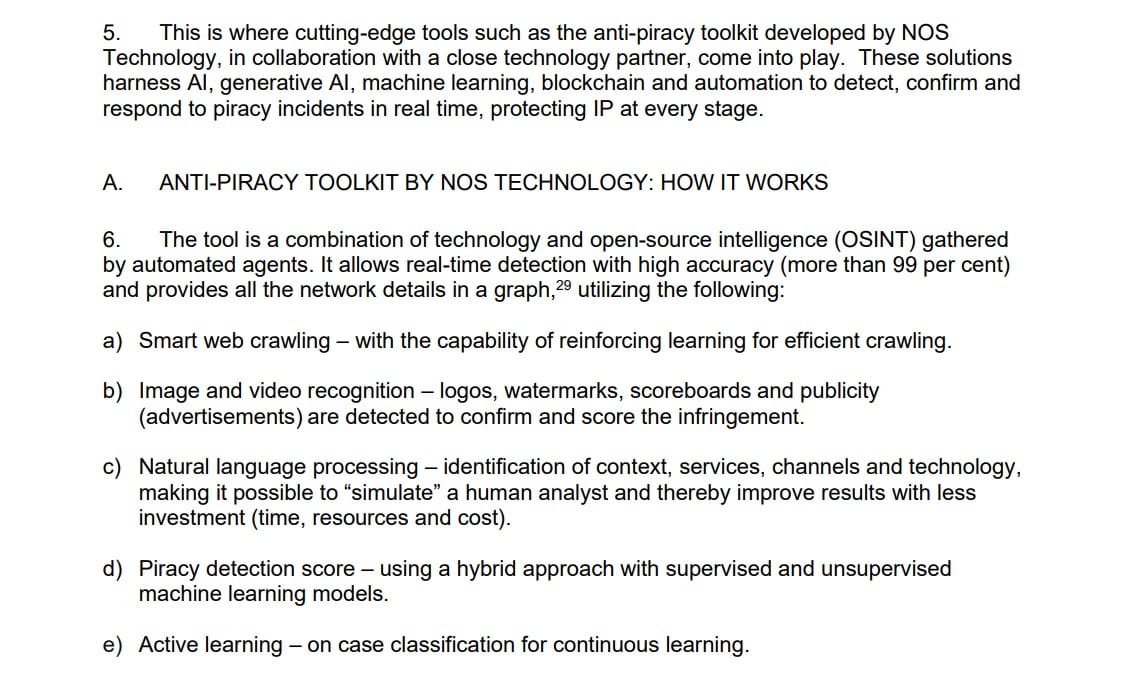 Artificial intelligence is everywhere today. It almost seems as if there’s no problem it can’t solve.
Artificial intelligence is everywhere today. It almost seems as if there’s no problem it can’t solve.
While a breakthrough use case for the public at large has yet to emerge, many companies and governments are incorporating AI into their workflow. That ranges from automating customer responses to gathering national intelligence.
It’s no surprise that copyright holders are experimenting with AI as well. Several anti-piracy groups and services are using the technology to their advantage. Specifics are rarely shared, however.
AI-Powered Anti-Piracy Tools
AI also came up last week during a meeting of WIPO’s Advisory Committee on Enforcement, in relation to novel technology that can help to address online piracy.
Portuguese company NOS Technology presented its anti-piracy toolkit, which aims to leverage new digital tools to combat piracy. With a description including terms such as generative AI and blockchain, it wasn’t difficult to grab attention.
The anti-piracy toolkit was highlighted by Pedro Bravo, NOS Technology’s Head of Content Protection, who shared a written presentation in advance. Piracy is described as a sophisticated global problem which is difficult to combat with ‘manual’ monitoring. That’s where the anti-piracy tool comes into play.
“These solutions harness AI, generative AI, machine learning, blockchain and automation to detect, confirm and respond to piracy incidents in real time, protecting IP at every stage,” Bravo writes.
While this sounds impressive, without context and detail, it is little more than a collection of buzzwords. The added explanation that the tool relies on “open-source intelligence” collected by “automated agents” is appealing, but not particularly enlightening either.

TorrentFreak reached out to NOS, hoping to learn more about the toolbox and its applications in the real world. However, at the time of publication we have yet to hear back. The good news, however, is that there are some pointers that show a concrete use cases.
Automated Blocking
In a section discussing the benefits of real-time detection, NOS says that the Ai-powered toolbox automatically issues takedown requests and blocks pirated streams.
Automated takedowns based on simple algorithms are nothing new. Many anti-piracy companies use these systems while YouTube and other large platforms are likely to use machine learning to detect infringements. Some of these systems can be considered AI, depending on the definition used.
In addition to standard takedowns, AI technology can also be leveraged to detect and block pirated streams. UK company Friend MTS has experience with automated blocking, for example, but it also urged restraint in the use of these tools, as mistakes can prove costly.
NOS Technology doesn’t share any technical details but a small-print footnote reveals one way its AI-powered toolbox is used to block streams.
“Administrative and Legal procedures in Portugal allow IP rights owners to request takedowns in real time or permanently by Domain or IP. The anti-piracy tool detects, validates, and sends an order to a blocking gateway that connects through API to the ISP.“
More important than its placement suggests, the footnote indicates that the toolbox is used to block pirated content automatically, as part of Portugal’s site blocking system. This presumably happens through a direct connection at the ISP level, without human intervention.
The anti-piracy tool apparently aims to be so powerful that it can prevent piracy before it happens. There are no finer details on how this would work, however.
“[T]he tool is capable of monitoring thousands of platforms, networks and users simultaneously. Predictive analytics ensure that piracy can be prevented before it takes place,” Bravo writes.
Hollywood is Interested
While it’s easy to overlook such reports due to a lack of detail, this one stood out because it sounds similar to a technology mentioned by MPA Senior Executive Vice President Karyn Temple at the same WIPO session last week.
The Motion Picture Association is the driving force behind global site blocking efforts and a major supporter of US site blocking bill FADPA. When the bill was made public, Temple discussed the MPA’s site blocking “best practices” where automated blocks were explicitly referenced.
The MPA believes that automated solutions are preferred in the fast-changing piracy ecosystem. This includes real-time monitoring of IP addresses and DNS servers.
This is not a pipe dream, as these systems are already in place. Without mentioning Portugal or any other country, Temple describes an automated blocking system that has a direct connection at the ISP level.
“[A]utomated communication systems have been put in place between rightsholders and ISPs that allow the first ones to swiftly communicate the updated online locations that should be blocked, subject to a dynamic court order or under the supervision of competent authorities,” Temple wrote.
NOS clearly states that its anti-piracy tool is AI-powered, but it’s not clear to what degree that applies to the automated blocking aspect. Whatever the case may be, it is undeniable that AI will be part of future anti-piracy tools, much like pirates will use AI to their advantage.
From: TF, for the latest news on copyright battles, piracy and more.
Powered by WPeMatico
